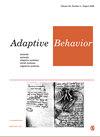The contingent animal: does artificial innateness misrepresent behavioral development?
IF 1.3
4区 计算机科学
Q4 COMPUTER SCIENCE, ARTIFICIAL INTELLIGENCE
引用次数: 0
Abstract
While organisms are continually experiencing and interacting with their environments, the role and extent of experiences in behavioral development has been controversial. Some argue that adaptive behaviors are acquired through experiences, while others claim they are the result of innate programs that don’t require environmental input. Such controversies have historically occurred within animal behavior and psychology, but similar debates are emerging in the field of artificial intelligence. Here, the debate is centered on those who design experience-dependent systems that are trained to learn the statistical properties of “environmental” inputs, and those advocating the use of pre-packaged artificially “innate” responses tailored to prespecified inputs. Those favoring artificial innateness draw analogies with animal behavior to argue that innateness is necessary for the emergence of complex adaptive behavior. But does behavioral development in animals reflect the unfolding of innate programs? Here we highlight the widespread role of specifically causal experiences in the ontogeny of species-typical behaviors. All behaviors are an outcome of a chain of organism-environment transactions—called ontogenetic niches—that begin in the earliest periods of life. This challenges the notion that organisms come prepared with innate programs for behavior. We suggest that an artificial intelligence that matches the complexity of animal behavior should be based on principles of behavioral development, where experiences are necessary and specifically causal factors in the emergence of behavioral abilities.或然动物:人为先天性是否歪曲了行为发展?
虽然生物不断经历环境并与之互动,但经历在行为发展中的作用和程度一直存在争议。一些人认为,适应性行为是通过经验获得的,而另一些人则认为,适应性行为是不需要环境输入的先天程序的结果。这种争论历来发生在动物行为学和心理学领域,但人工智能领域也出现了类似的争论。在人工智能领域,争论的焦点是那些设计依赖于经验的系统,并训练它们学习 "环境 "输入的统计特性的人,以及那些主张使用预先包装好的人工 "先天 "反应,以适应预先指定的输入的人。支持人工先天性的人将先天性与动物行为进行类比,认为先天性是复杂适应行为出现的必要条件。但是,动物的行为发展是否反映了先天程序的展开呢?在此,我们强调特定因果经验在物种典型行为的本体发生过程中的广泛作用。所有行为都是一连串生物-环境交易的结果,这些交易被称为 "本体龛"(ontogenetic niches),始于生命的最初时期。这就对生物天生就有行为程序的观点提出了挑战。我们建议,与动物行为的复杂性相匹配的人工智能应该建立在行为发展原则的基础上,在行为能力的产生过程中,经验是必要的,也是具体的因果因素。
本文章由计算机程序翻译,如有差异,请以英文原文为准。
求助全文
约1分钟内获得全文
求助全文
来源期刊

Adaptive Behavior
工程技术-计算机:人工智能
CiteScore
4.30
自引率
18.80%
发文量
34
审稿时长
>12 weeks
期刊介绍:
_Adaptive Behavior_ publishes articles on adaptive behaviour in living organisms and autonomous artificial systems. The official journal of the _International Society of Adaptive Behavior_, _Adaptive Behavior_, addresses topics such as perception and motor control, embodied cognition, learning and evolution, neural mechanisms, artificial intelligence, behavioral sequences, motivation and emotion, characterization of environments, decision making, collective and social behavior, navigation, foraging, communication and signalling.
Print ISSN: 1059-7123
 求助内容:
求助内容: 应助结果提醒方式:
应助结果提醒方式:


